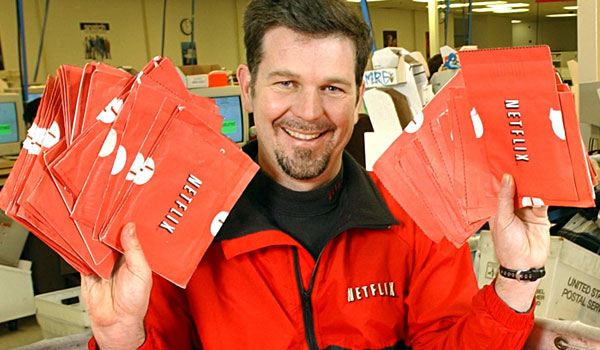For some time now, net neutrality has been a ’cause celebre’ for web geeks.
The idea – that all traffic on the internet should be treated equally, regardless of source, content or intent – is one that’s pretty compelling. It speaks to the democratic ideals of the web as a place where anyone can get their message out as long as they have access to a computer.
Yet, lately, a couple of statistics have arisen that might threaten to throw a wrench into plans for enshrining net neutrality into law.
First is that during prime time, Netflix consumes up to 20% of all bandwidth. Second is that, during that usage, it’s 2% of users who are using up all this bandwidth. This does not bode well for net neutrality.
Hogs at the Trough

The argument for net neutrality has always been that the internet should be built on the principle of fairness – in part because it’s right, and in part because, in the past, it’s been impossible to do.
See, historically, there has always been a link between how much money you have and how easy it is to wield influence, get your ideas out or start a business. This is because there was a link between physical stuff and your capacity to reach people. Want to spread the word about your new store? You needed ads in newspapers or TV. Same deal with political ideas or campaigns. Those with more money could get reach more people because the networks we distributed things on favored the wealthy. TV towers, printing presses, radio airtime – all these things weren’t cheap.
The web was supposed to change that – and it did. Because businesses like YouTube are built on spreading content regardless of its origin, it wasn’t supposed to matter who you were.
But, bandwidth isn’t an infinite resource. At any given point, there’s only so much to go around. And if Netflix is now taking up 20% of prime time bandwidth, what happens next year when they might take up 30%?
And at that point, will it be fair that governments will legislate all traffic be treated equally? When a multimillion dollar corporation like Netflix Inc. is tying up a fifth of all traffic across the web in one country? Shouldn’t ISPs get to charge Netflix more for that high-bandwidth HD video?
(Edit: some readers have pointed out that Netflix does already pay for the bandwidth it uses, and shouldn’t have to pay more for using more. I apologize for the insinuating the inverse. The question, however, is whether ISPs could charge end-users more for using Netflix, which would be the opposite of what Net Neutrality advocates are in favor of. In response to that idea, I’d venture my defense of net neutrality below still makes sense, as end-users should not have to pay more to receive certain types of content.)
Why Net Neutrality Still Makes Sense
It’s certainly a sticky issue. But here’s why net neutrality still makes sense: even if one video streaming company takes up even half of all bandwidth, this is the price we have to pay for an open web.
Here’s the thing: net neutrality, even in the form of strict government legislation, relies on the idea that it should be what people are doing online that guides the direction of the web – and that furthermore, people should be able to do whatever they want without restriction. Rather than corporate interests deciding which traffic is prioritized, faster or more widely accessible, net neutrality is the principle that when all traffic is equal, it provides the best possible chance that the internet will be a medium for free and open expression.
So, even in the face of a company like Netflix dominating traffic, net neutrality still makes sense. ISP’s will be forced to expand bandwidth requirements instead of deciding which videos, images and text are ‘worth more’ than others. More to the point, unlike the tightly controlled media of the past, a free and open internet will be available to all, equally, chipping away at the massive difference in reach and power between regular people and massive companies.
And if Netflix paying the same for bandwidth as some guy or girl down the street is how we get there, then so be it.





11 User Comments
adam
Your article contains one crucial, logical error: It’s not Netflix themselves who are using the the bandwidth; it is Netflix CUSTOMERS who are using the bandwidth. Those Netflix customers who are watching tons and tons of movies are ALREADY PAYING THE ISPs MORE for faster internet connections.
Netflix is paying ISPs for bandwidth already as well, they’re not getting a free ride.
Just because Netflix is popular shouldn’t mean they have to pay more for bandwidth then any other service.
Irk
Every business model I’ve seen with prices changed for people using MORE of a commodity has them getting a volume/bulk discount. Charging someone more per unit because they’re using more of it doesn’t make sense to me.
Now, limiting the amount they can use because of supply and demand concerns isn’t unheard of – but that means Netflix itself would be throttled, yes? Not the users of Netflix – they’re using other things in addition to Netflix.
Not to mention that the people not using Netflix and other media services aren’t going to be using up a lot of bandwidth, so it’s not as if they’re demanding the bandwidth that Netflix users are taking up, are they? They don’t need it. They’re watching cable.
Nathan
I think part of the problem is that you’re being sold an eight meg internet pipe from your cable provider, with the understanding that you won’t use it. They sell hundreds, thousands of 8mb pipes and hook them up to a pipe that’s not 1% the total size. That’s fine when everyone is using burst speeds for occasional downloads, but it doesn’t scale to running your connection at 100% for an hour or two at primetime. They can’t afford to give you a 100% duty cycle connection at your burst speed, you couldn’t afford internet service if they did.
One alternative would be to allow burst at 8mb, then scale back to 1mb or less. This kind of traffic shaping would be fair and neutral, since it’s a reflection of what the customer is paying for. You’d still get snappy surfing, but you’d be forced to stream down movies, not in realtime necessarily, but into a buffer at a bandwidth that would be reasonable given the uplink your provider can dedicate to you.
asd
Buy a clue. Netflix pushes it’s traffic by way of internet exchanges like torix etc. This is transit not internet bandwidth.
The ISP’s get it free from netflix if they want.
Total nonsense
Eugene Cook
The story is Netflix uses 20 percent of the peak bandwidth USAGE, not 20 percent of the actual available bandwidth. There is still a lot of dark fiber still out there.